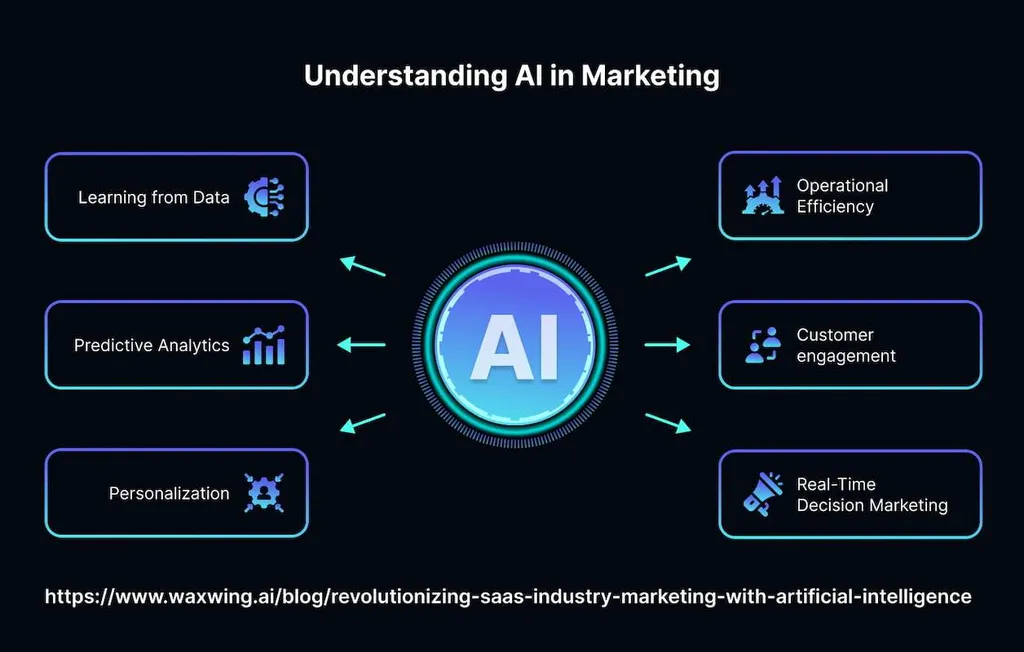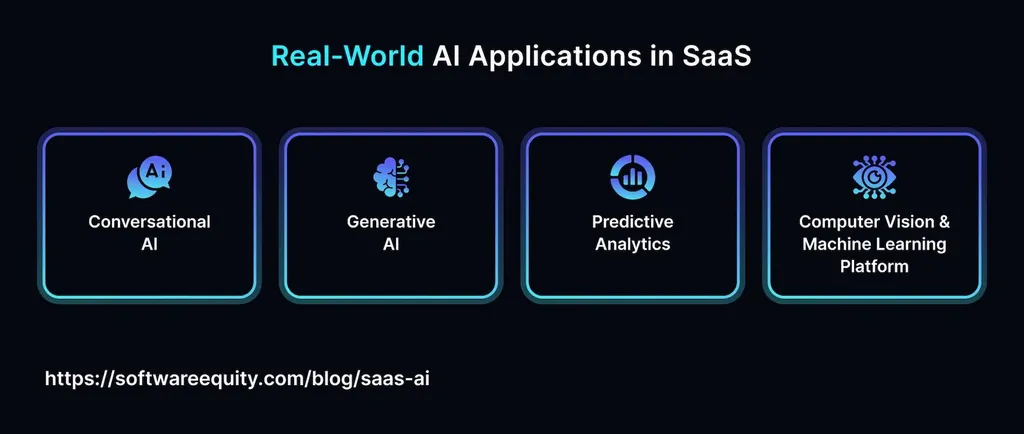The adoption of Artificial Intelligence (AI) technology shapes the way businesses operate and consume resources. Implementing new program distribution models allows companies to reduce costs and scale operations without significant investments. In this guide, we will explore the importance of AI in SaaS and demonstrate how it enables enterprises to get an edge and expand the scope of activities.
Utilizing the Software as a Service (SaaS) approach, it becomes possible to access cloud-based apps and leverage the power of distributed computing to streamline the deployment of digital products, embrace effective data management practices, and implement top-grade security measures. Cloud providers hosting applications online allow users to access them from anywhere freely.
What is AI in SaaS?
The fusion of these technologies signifies a pivotal shift in resource allocation methods. Organizations no longer have to buy expensive hardware, maintain large data centers on-premises to access large amounts of computing power or install anything locally. Moreover, AI applications built on complex algorithms and fine-tuned based on huge datasets demonstrate effectiveness in various domains, from customer support to supply chain management.
For SaaS providers, AI opens many opportunities allowing them to expedite product development, enhance customer experience (CX), and handle repeating tasks.
By some estimates, 75% of SaaS products will leverage AI by 2025. Large enterprises already employ AI to increase efficiency, reduce expenses, integrate machine learning (ML) algorithms to make decisions based on accurate data, discover leads, and provide personalized recommendations.
Natural language processing (NLP) is another notable technology enabling machines to understand user intent, which makes it best suited for upgrading virtual assistants.
Below, we have outlined the key advantages of implementing AI in SaaS:
- Personalized experience: After analyzing large volumes of data, including chats, emails, order histories, and transcripts of phone conversations, AI assistants get deep insights into user behavior patterns. This capacity streamlines marketing automation and enables chatbots to write relevant recommendations and boost conversions.
- Accurate predictions: Processing huge datasets empowers AI to foresee changes in trends and identify lucrative up-sales opportunities. Such an ability makes generative AI invaluable for cloud-hosted customer relationship management systems.
- Task automation: As data entry and other routine processes take up a lot of valuable time, deploying SaaS apps with AI features fosters workflow optimization.
- Upgraded security: Due to AI, developers safeguard SaaS apps by adding features that allow them to timely detect threats, identify unusual activities, and diminish data leakage risks.
- Customer support: Chatbots automatically process basic queries, helping human employees to manage increased workloads.
- Cost efficiency: AI optimizes SaaS apps’ performance, which makes such solutions invaluable for small and medium-sized businesses.
AI products facilitate the stable functioning of SaaS applications and enable them to process huge amounts of information, thus contributing to UX improvement.
How to Benefit from AI in SaaS?
Utilizing cloud application services opened a window of opportunities for companies seeking to streamline their processes, minimize expenditure, and sustain strong market positions.
As personalization is a prerequisite to success, using the power of AI lets businesses cater to the needs of clients and provide users with individual offerings. Enterprises of all sorts integrate AI in SaaS to reach the key objectives and enjoy the advantages described below.
Short time to market
Integrating AI enables SaaS firms to speed up product development by streamlining main processes, including writing code, generating new ideas, testing, discovering vulnerabilities, improving design, and managing complex projects.
Identifying audience segments potentially interested in specific projects facilitates finding new ways to optimize products. Besides, noticing obstacles that may cause delays is the first step to setting up protection measures.
Efficient product management
Employing AI, professionals timely detect the emergence of trends shaping customer perceptions, analyze feedback across multiple channels, write mistake-free reports and guidelines, devise plans, make UX more targeted, estimate the steps taken by competitors, and eliminate bias.
The potential of complex AI models trained on high-quality data is impossible to underestimate. Product managers no longer need to edit roadmaps manually, synchronize schedules, re-adjust priorities, and cope with other routine tasks.
Revamped customer service
When the amount of client requests drastically increases, it may be challenging to handle large volumes of tickets without automation. AI-driven chatbots integrated with legacy systems are available 24/7, which enables them to solve basic issues within a fraction of a second and escalate complex tasks to human agents. Short response times boost satisfaction rates and help firms build long-term relationships with clientele based on mutual trust.
SaaS platforms expand outreach by increasing user engagement and ensuring clients are happy with an offering. Avoiding churn necessitates employing ML-based predictive analysis tools to estimate how client behavior may change and reduce the risk of disengagement.
Training programs
Speeding up staff onboarding has never been easier, as AI services provide real-time tips to assist employees at every stage of the learning process. Offering an engaging way to learn new information, cloud-based educational sites can also be used to educate clients.
Short videos with informative content demonstrate the tremendous potential of microlearning practices. As investing in gear to shoot and process footage is a costly endeavor, firms employ AI to enhance videos, add subtitles automatically, and apply effects to achieve realistic results.
Professional marketing campaigns

SaaS providers establish strong positions in the industry by devising result-yielding promotion strategies. Boosting revenue requires collecting accurate data, discovering how to make an offering more tailored, coming up with appealing incentives, and employing AI and ML in SaaS solutions to generate leads, achieve better conversion rates, and reach key goals.
High-grade security
SaaS firms safeguard sensitive data using AI. Even the most reliable platforms may be attacked by hackers seeking to distort their seamless operation. AI models facilitate the development of cybersecurity mechanisms protecting data from breaches. Trained to recognize suspicious actions, they isolate viruses to stop them from destroying valuable assets.
Analytics tools
SaaS firms rely on AI to discover development opportunities and get deep insights into clients’ preferences, habits, and needs. Capable of collecting large amounts of valuable data, AI solutions predict purchase patterns and offer well-thought-out recommendations. Understanding why people order specific products facilitates developing a viable strategy to provide clients with the best answer to their woes.
Tips and Reminders

Even though powered by Artificial Intelligence SaaS platforms have clear advantages in a volatile environment as they adapt to the changes in the industry and build loyal client bases, their owners should be aware of challenges. We have devised easy-to-follow guidelines for those who want to diminish threats and build sustainable businesses:
- Eliminate biases: Using poorly trained algorithms and low-quality datasets leads to unpleasant consequences that may stain the reputation of a provider and result in significant losses. Detecting potentially discriminatory practices is necessary to expand the audience and guarantee that no minority groups are excluded. Maintaining equality is pivotal for organizations offering financial assistance or providing HR services.
- Integrate extra mechanisms to protect privacy: Adding an additional layer of protection is crucial if you work in the healthcare sector or other industries dealing with sensitive data. Embracing a transparent approach enables firms to remain compliant and utilize collected information ethically.
- Increase accountability: Widespread concerns about the ways enterprises utilize gathered information slow down AI adoption. SaaS app developers should demonstrate a willingness to accept responsibility for possible failures and show that they have taken steps to avoid them. The providers of services for healthcare institutions or manufacturers of autonomous vehicles can expedite adoption after proving their readiness to use AI to protect users.
- Prevent pilot failures: Another obstacle to the acceptance of AI-powered SaaS products is based on doubts about their effectiveness in real settings. Understanding that making the most of this technology requires prolonged staff training allows businesses to create teams of experienced specialists capable of using versatile AI tools for maximum benefit. Getting a deep understanding of the intricacies enables organizations to analyze datasets automatically, optimize workflows, and circumvent limitations.
Following these steps is crucial if a company intends to strengthen its position in the industry and build long-term bonds with clientele.
Conclusion
As the industry is shaped by technological advancements all the time, getting ahead of the curve necessitates using sophisticated algorithms to discover internal process optimization opportunities. Offering personalized products, incentives, and services to end-users facilitates expanding outreach, boosting revenues, reducing expenses, and implementing innovations.
The significance of AI in SaaS lies in the ability of such models to process huge amounts of data, thus enabling providers to tailor offerings and make marketing efforts targeted. MetaDialog has a team of professionals ready to assist you with the integration of custom AI models. They are trained to meet the needs of your clientele. Contact our experts now and learn how to provide top-level SaaS services to become the industry’s leader.
